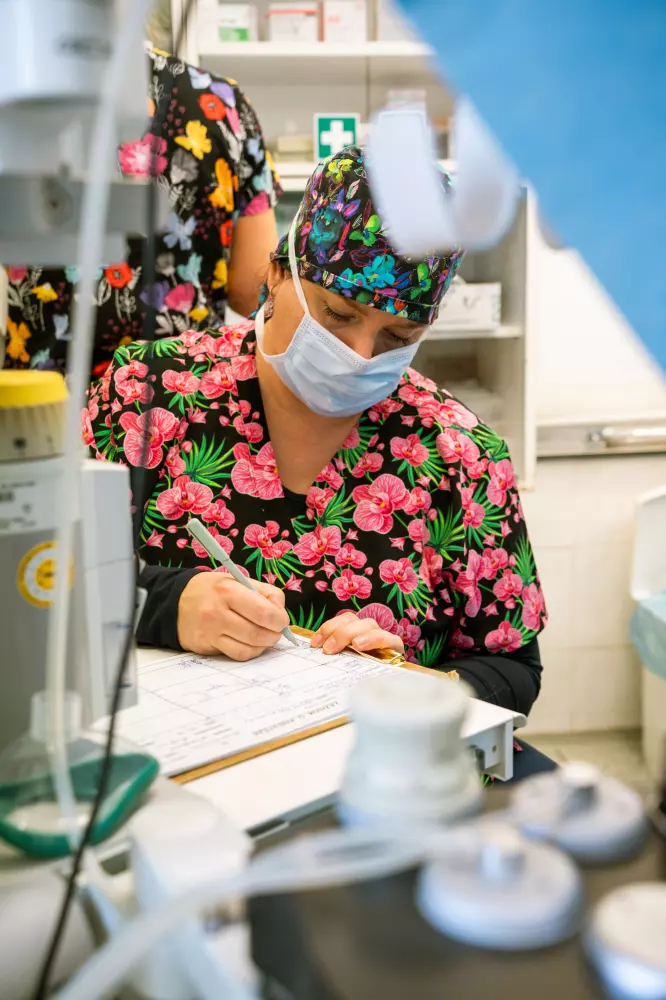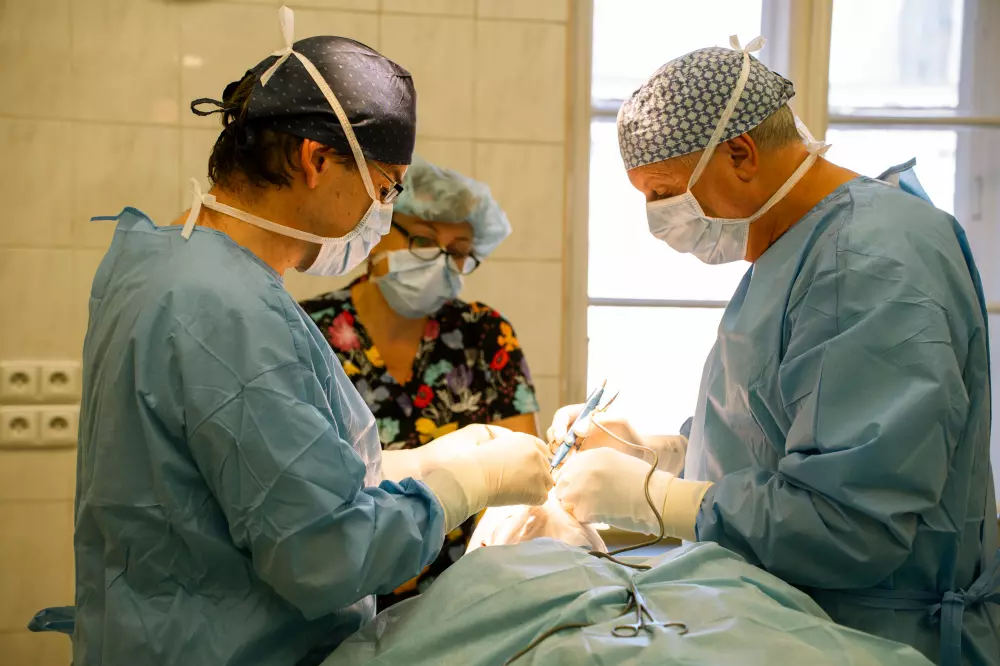What types of anaesthesia are used in plastic surgery?
There are three most frequent options used in plastic surgeries:
How do we determine whether to use general or local anaesthesia?
The choice of anaesthesia depends on several factors such as the length and extent of the surgery and the patient's health and preferences. If the surgery is short and less invasive, we can choose local anaesthesia. In case of longer or more complicated operations, we usually opt for general anaesthesia. The anaesthesiologist always takes into account the surgeon's intended procedure and the patient's overall condition.
How does the patient prepare for anaesthesia before a surgery?
The preparation includes:

What are the main anaesthesia-related risks and how can we minimize them?
Anaesthesia involves several potential risks. The first requirement is correct information, the patient's, health and empty stomach. Everything is discussed with an anaesthesiologist on the day of the operation. Most of the complications occur during the initial and final stages of anaesthesia – e.g. difficulties in airway management, inhalation of gastric contents or allergic reactions. During an operation, problems can occur with blood circulation or ventilation or surgical complications such as large blood losses. Consequently, an erudite anaesthesiologist trusted for his abilities and provision of true information is always required to attend the surgery.
What are the most common myths about anaesthesia that you can encounter?
What health factors can affect anaesthesia?
Anaesthesia brings about risks arising from the patient's associated illnesses (increased blood pressure, diabetes, cardiac, lung and kidney diseases), absence of fasting, risk behaviour, drugs or alcohol.
Are there any contraindications for general anaesthesia?
We always take into account the benefit of the operation over potential risks arising from anaesthesia. This is particularly true of advanced stages of chronic diseases.
What should a patient know about anaesthesia if he takes allergy medication?
The anaesthesiologist should always be informed of any allergies in advance so that he can choose safe anaesthetic options. We are concerned not only with allergies to medications but also with food allergies.

How long does anaesthesia usually take and what affects its length?
The length of anaesthesia is derived from the type of operation. There is no time span – it is administered as required.
What happens during a surgery as regards the anaesthesiologist?
The anaesthesiologist continuously monitors the patient's life functions such as cardiac activity, blood pressure and blood oxygenation, modifies doses of the drugs and deals with potential complications arising from the surgery.
How does an anaesthesiologist monitor the patient's condition during a surgery?
The patient is continuously monitored during the surgery – heart rate, EKG, blood pressure and blood losses. In case of general anaesthesia, we also monitor the ventilation parameters and levels of inhalational anaesthetics.
How does waking up from general anaesthesia proceed?
Towards the end of a surgery, we gradually stop administering the anaesthetic and after its elimination, the patient wakes up. Waking up always takes place in the operating theatre. The patients are not released from the operating theatre without stable life functions. They do not usually remember it. They are only aware of a transport back to the room.
Does a clinic always have an intensive care unit and is it necessary? When is it necessary?
An intensive care unit (ICU) is not a required standard in each clinic. Its need depends on the type and scope of the performed operations. Most plastic surgeries such as facelift, liposuction, eyelid operation or breast augmentation proceed without complications and the patients recover in a standard post-operative room. If a clinic is equipped with a quality monitoring system and has an experienced team, an ICU is not a necessity.
An ICU may be required for persons with more serious health complications, very large operations (e.g. combined operations with a longer period under anaesthetics) or an increased risk of complications such as cardiac or lung problems.
Can I experience nausea or other side effects after anaesthesia?
Yes, nausea and vomiting are the most frequent complications after anaesthesia. If you have any experience with nausea after an operation, always inform the anaesthesiologist. There are medicines that can reduce the probability. Most of the problems will disappear within 24 hours after the surgery.
How long does it take for the body to get rid of the effects of anaesthesia?
Most of the patients experience lingering drowsiness on the day of the operation. Therefore, they should not make important decisions with legal consequences or drive a car on the day of the operation. They should have a person accompanying them after release from the hospital.
What to do if pain or other discomfort appears after a surgery?
The post-operative pains can usually be alleviated with freely accessible analgesics. However, if other complications persist, contact a doctor.

Does anaesthesia in plastic surgery differ from other operations?
We do not usually perform large operations lasting for several hours at the plastic medicine clinic. The spectrum ranges from short to medium-length surgeries. The anaesthesiologist and the surgeon should always agree on the intended procedure and consider the patient's overall condition. Otherwise, there is in principle no other difference from other operations.
What are the most common complications with anaesthesia in plastic surgeries?
The potential complications are the same as in other types of operations: nausea, vomiting, prolonged awakening from anaesthesia and a sore throat (after intubation).
Can any operations be performed without general anaesthesia?
Yes, smaller surgeries can be performed under local anaesthesia. The particular procedure is agreed between the anaesthesiologist and the surgeon with view to the intended procedure and the patient's overall condition.
Why the nails should not be varnished under anaesthesia?
Monitoring machines measure blood oxygenation through the nails and some varnishes, namely gel nails, distort the values.
What are the modern trends in anaesthesia for plastic surgeries?
The desired outcome is the safest possible anaesthesia and the patient' quick, uncomplicated return to normal life after the anaesthesia.
What medications and food should be avoided before a surgery?
Chronic medications can be modified after an agreement based on the patient's overall condition. One day before a surgery, there should be a light supper, while on the day of the surgery, no breakfast and only clear liquids (non-sparkling water or tea) should be consumed. Drinking black coffee or coffee with milk is not suitable. On the day of the operation and ideally a day before, smoking should be avoided.
What to do if we are nervous about anaesthesia?
The main principle is trust in the anaesthesiologist's expertise. If you are concerned, please contact us.
How to prepare for anaesthesia to make an operation as safe as possible?
Follow the doctor's instructions.
How long after an operation should we avoid driving cars or performing other activities?
Driving or taking important decisions with legal consequences is not recommended within twenty-for hours after general anaesthesia. Other restrictions may arise from the actual surgery.
The article was produced in cooperation with MUDr. Kateřinou Kvapilovou, an anaesthetic and resuscitation specialist at the UEM Emauzy clinic.